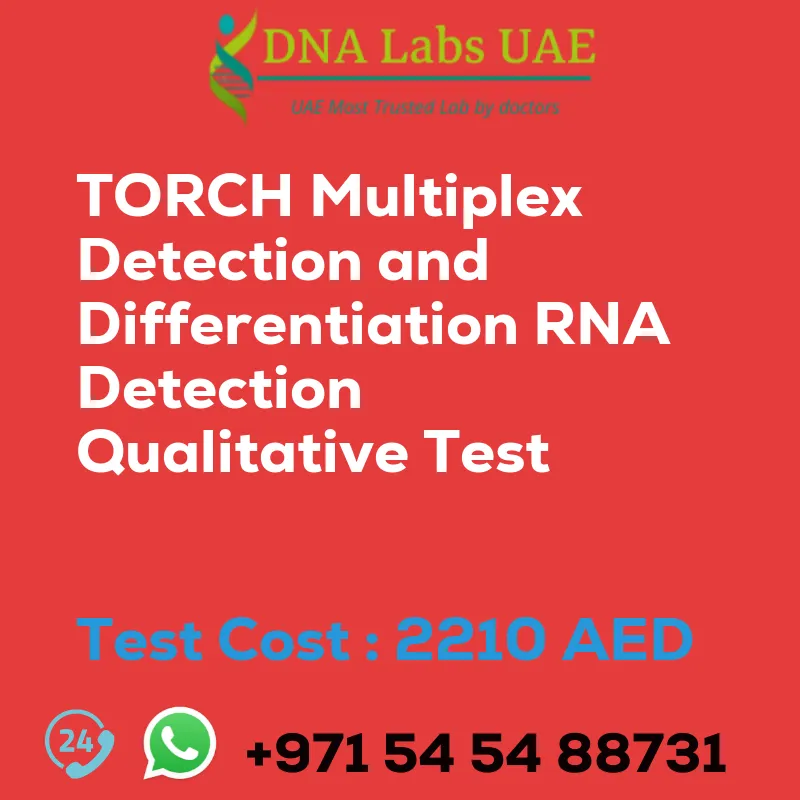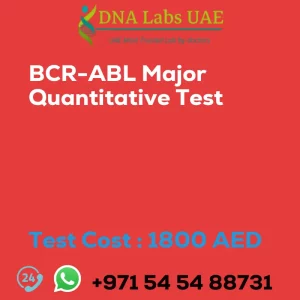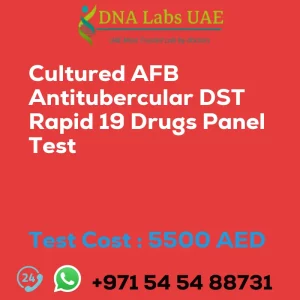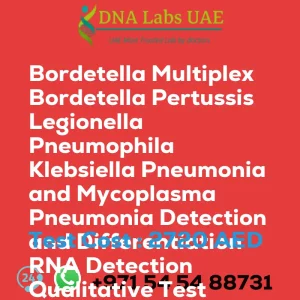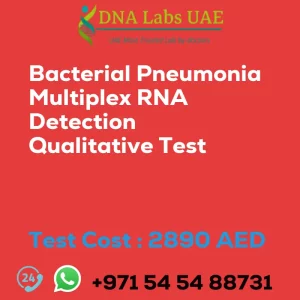TORCH Multiplex Detection and Differentiation RNA Detection Qualitative Test
Welcome to DNA Labs UAE, your trusted genetic lab in the UAE. Today, we will be discussing the TORCH Multiplex Detection and Differentiation RNA Detection Qualitative Test and its cost.
Test Name: TORCH Multiplex Detection and Differentiation RNA Detection Qualitative Test
Components:
- Price: 2210.0 AED
Sample Condition:
Blood, Serum, Swab, Amniotic fluid, chorionic villus (removal of chorionic villi from the placenta during pregnancy), csf, urine, skin lesions, etc.
Report Delivery:
4th Working Day Email: 48 hours
On phone: 36 hours
Method:
Real Time PCR
Test Type:
Viral
Doctor:
Physician
Test Department:
Genetics
Pre Test Information:
Patients need to sign a Consent document and bring any clinical history for TORCH Multiplex Detection and Differentiation (RNA Detection) Qualitative Test.
Test Details:
The TORCH (Toxoplasma, Other agents, Rubella, Cytomegalovirus, and Herpes simplex virus) Multiplex Detection and Differentiation Test is a qualitative test used to detect and differentiate the presence of RNA from these specific pathogens in a patient’s sample.
The TORCH panel includes various pathogens that can cause congenital infections in newborns if the mother is infected during pregnancy. The test is typically performed on amniotic fluid, fetal blood, or neonatal blood samples.
The test utilizes a multiplex polymerase chain reaction (PCR) technique to simultaneously amplify and detect the RNA of Toxoplasma gondii, Rubella virus, Cytomegalovirus (CMV), and Herpes simplex virus (HSV) in a single reaction. The PCR amplifies specific target sequences from the RNA of these pathogens, allowing for their detection.
The qualitative nature of the test means that it provides a “yes” or “no” answer regarding the presence of RNA from these pathogens in the sample. If the test is positive, it indicates the presence of one or more of these pathogens in the patient’s sample, suggesting a potential infection.
The TORCH Multiplex Detection and Differentiation Test is an important tool in diagnosing congenital infections and guiding appropriate management and treatment for affected infants. It allows for early detection and differentiation of these pathogens, enabling timely intervention to prevent or mitigate the complications associated with these infections.
| Test Name | TORCH Multiplex detection and Differentiation RNA Detection Qualitative Test |
|---|---|
| Components | |
| Price | 2210.0 AED |
| Sample Condition | Blood, Serum,Swab, Amniotic fluid, chorionic villus (removal of chorionic villi from the placenta during pregnancy), csf, urine, skin lesions.etc |
| Report Delivery | 4th Working Day Email : 48 hours.On phone : 36 hours |
| Method | Real Time PCR |
| Test type | Viral |
| Doctor | Physician |
| Test Department: | Genetics |
| Pre Test Information | Need to sign Consent document and bring any clinical history of patient forTORCH Multiplex detection and Differentiation (RNA Detection) QualitativeTest |
| Test Details |
TORCH (Toxoplasma, Other agents, Rubella, Cytomegalovirus, and Herpes simplex virus) multiplex detection and differentiation test is a qualitative test used to detect and differentiate the presence of RNA from these specific pathogens in a patient’s sample. The TORCH panel includes various pathogens that can cause congenital infections in newborns if the mother is infected during pregnancy. The test is typically performed on amniotic fluid, fetal blood, or neonatal blood samples. The test utilizes a multiplex polymerase chain reaction (PCR) technique to simultaneously amplify and detect the RNA of Toxoplasma gondii, Rubella virus, Cytomegalovirus (CMV), and Herpes simplex virus (HSV) in a single reaction. The PCR amplifies specific target sequences from the RNA of these pathogens, allowing for their detection. The qualitative nature of the test means that it provides a “yes” or “no” answer regarding the presence of RNA from these pathogens in the sample. If the test is positive, it indicates the presence of one or more of these pathogens in the patient’s sample, suggesting a potential infection. The TORCH multiplex detection and differentiation test is an important tool in diagnosing congenital infections and guiding appropriate management and treatment for affected infants. It allows for early detection and differentiation of these pathogens, enabling timely intervention to prevent or mitigate the complications associated with these infections. |

